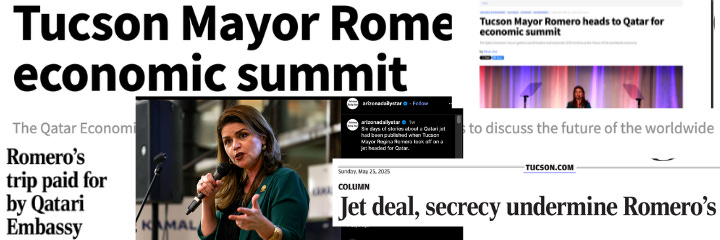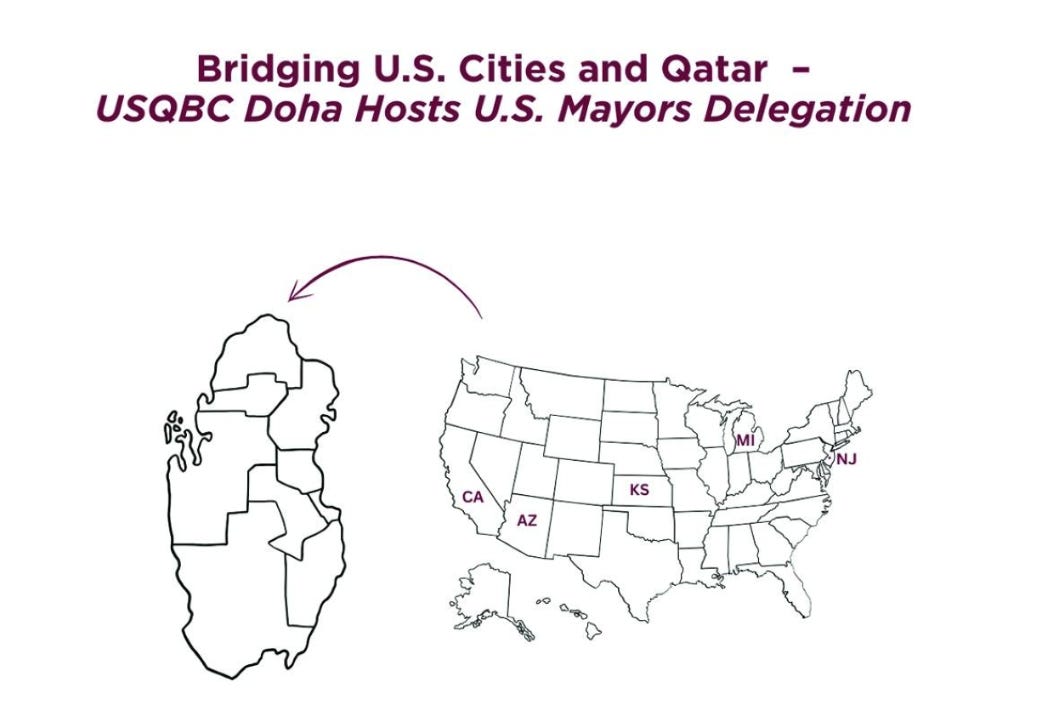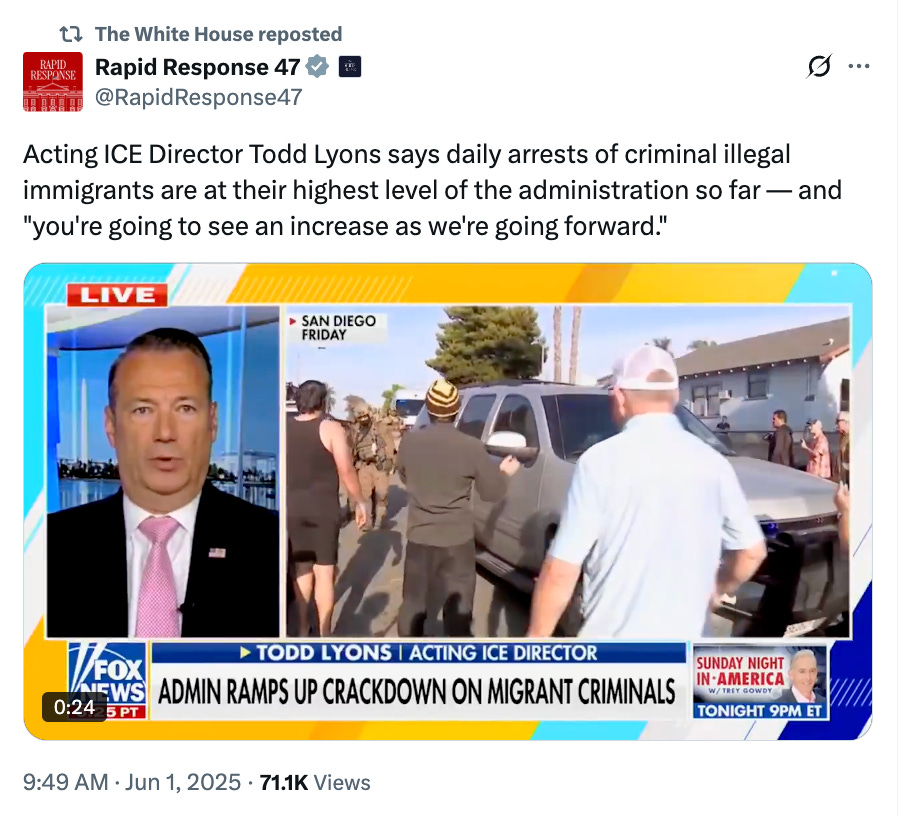Mayor talks Qatar
This isn’t her first junket … Budget bill cuts gun violence programs … And a new bid for Baja Arizona.
Even as news broke that Tucson Mayor Regina Romero traveled to Qatar for an economic forum, many in Tucson knew this wasn’t her first overseas trip representing the Old Pueblo.
Heck, we reported on her trips to Portugal, Peru, and Mexico City in 2024 back in February. All those trips were paid for by third parties, which is why they appeared on Romero’s financial disclosure form.
On Friday, Romero sat down with the Tucson Agenda to answer questions about her visit to the capital of one of the wealthiest nations on Earth. It was one of several interviews Romero gave last week about the trip.
Details during her time abroad were vague as her office insisted on a full report when she returned — more on that in a minute — leading to inaccurate initial reports that forum host Bloomberg paid for the trip.
Narrator: They did not, the Qatari Embassy did.
Romero’s critics said the trip shows the two-term Democrat is more interested in flying around the world than addressing issues in Tucson.
So why the secrecy?
Security, she says. The Tucson Police Department has advised her office not to advertise her out-of-town travel ahead of time. TPD provides a security detail for the mayor — as it did for her predecessor, Jonathan Rothschild.
“If I announce that I'm leaving, that could pose a security threat to my family and my home,” she said. “My address has been shared publicly by anti-vaxxers and MAGA extremists.”
The trip had been planned for months, as Romero says she is looking to put Tucson on the map when it comes to attracting economic investments. The five mayors who attended the forum were honored guests at a dinner specifically organized for them to meet with Qatari investors.
“It is about networking and putting our name out there and talking about why, for example with me, why Tucson is the place for investment both for the Mexican companies and Qatari businesses,” Romero said. “This for me was an opportunity to be able to present Tucson to potential investors that could create high-wage, long-term jobs in our community.”
So what fruit has come from these trips?
There is a reason why Romero wants it on the record she loves flying out of Tucson International Airport. Romero is optimistic the trip to Mexico made some connections with Mexican airline Volaris.
And maybe it’s good to be in the room where it happened?
The three-day forum led to at least 20 economic agreements, each aligned with the forum’s theme of “The Road to 2030: Transforming the Global Economy,” the Gulf Times reported.
At a moment when the federal government is considering banning international students from attending Harvard, Romero said she discussed opportunities for the University of Arizona — her alma mater1 — in Qatar.
The President of Higher Education at the Qatar Foundation for Education, Francisco Marmolejo, taught at the UA and met with Romero during her trip.
“Most Qataris enjoy free education from 0 to PhD. And what Qatar has done is invite American universities to be at this campus,” Romero said. “They have Texas A and M, they have George Mason, they have Northwestern, they have George Washington and they have many other American universities at their campus (in Doha.)”
While Qatar officials hyped their economic forum, the country also has come under fire from international human rights groups. Migrant workers, for example, “face serious abuses, including wage theft, restrictions on changing jobs and inadequate grievance and redress mechanisms,” Amnesty International wrote in their report on Qatar. The country also discriminates against the LGBTQ community, and Qatar’s “guardianship system” severely restricts women’s rights.
Romero has no regrets about the trip.
“People expect me as mayor to be able to represent Tucson in not just Arizona and the country, but internationally,” Romero said.
Romero missed one Council meeting, as well as a special joint meeting of the Regional Transportation Authority Board and the Pima Association of Governments Regional Council. The latter was scheduled long after Romero had committed to the overseas trip.
Some of the best wonky nuggets are the product of us covering southern Arizona for years. Upgrade to a paid subscription to invest in local journalism.
Former Congresswoman Gabby Giffords and Congressional District 7 candidate Adelita Grijalva held an event in midtown Tucson to talk about lesser-known federal cuts to community programs.
The Friday morning discussion included a local pastor who discussed cuts to community violence prevention programs across the country.
The panel also included a recent high school graduate and an elementary school teacher who spoke about how a $1 billion cut announced by the Trump administration will dismantle a program that helps schools hire mental health professionals, including counselors and social workers.
Pastor Grady Scott of Grace Temple Baptist Church in Tucson, said he works with Baptist churches across the nation on programs that bring community members together to find ways to resolve their issues peacefully. Some of these churches currently get federal funding to hold community mediations to reduce gun violence.
“We're seeing an increase in gun violence all over the country. And if we want to stem that tide, if we want to make people more likely to resolve their issues peacefully. We're going to need programs like this,” he said.
Mariana Martinez, a recent Pueblo High graduate, told the room that she has spent the last few years practicing lockdown drills more than fire drills.
She described being in high school during an actual lockdown, having friends who were just 20 feet away from a student who brought a gun to the school. While no one was hurt, Martinez painted a picture of how classroom doors would lock once closed during a lockdown and the panic of finding a room to shelter in place.
Elma Alvarez, a teacher at Miller Elementary School, believes many of her students need mental health support.
“Whether it's anxiety, depression, grief or trauma, many kids are carrying heavy emotional burdens that make it hard to focus on everyday school activities. Most of our children are on survival mode,” she said.
With funding being cut back and districts unable to qualify for funding for counselors, Alvarez said it will hurt families in her school.
“We need these professionals, especially in our low-income schools because most of our parents cannot afford to take them to doctors, psychiatrists, therapists,” she said.
Masking their identity: Two ICE agents told a southside woman they worked for Tucson Electric Power as a way to get information on her neighbor, who doesn’t have legal status, KGUN’s Reyna Preciado reported. The neighbor filmed the encounter and told her neighbor not to open the door, after the agents confirmed to her they didn’t have a warrant. TEP says its employees wear clothes with the TEP logo on them and every employee carries an ID badge that they’re required to show when asked. A spokeswoman for ICE told the Arizona Daily Star’s Emily Bregel to be “very careful with the TEP storyline,” but didn’t elaborate. After news broke of the incident, eight Democratic lawmakers from the Tucson area sent out a news release saying the Trump administration’s mass deportation program is leading federal agents to “lying and obliterating ethical lines,” along with due process.
“Gaining access to homes without a warrant by taking advantage of the trust people place in service provides like utility companies is inappropriate, unnecessary and stokes communitywide fear. This type of deceit makes our communities less safe,” the Democratic lawmakers wrote.
One or the other: After learning she’d have to give up her seat on the Pima Community College Governing Board, Theresa Riel reluctantly dropped out of the race for the Ward 6 seat on the Tucson City Council, the Tucson Sentinel’s Jim Nintzel reports. The city charter says council members cannot hold any other elected office simultaneously, which became clear last month when Sunnyside board member Robert Jaramillo was trying to get appointed to the Ward 5 seat.
On the campaign trail: Congressional District 7 candidate Daniel Hernandez made his position clear on Trump’s tariffs in an op-ed in the Tucson Sentinel. The tariffs are “reckless” and impose an unnecessary burden on southern Arizona households. As a kid growing up in a Mexican immigrant household, he knows “what it’s like to feel the pressure when prices go up, but your family’s paycheck doesn’t,” Hernandez wrote.
Just had to mention: The U.S. military is really pumping up its social media game as it advertises its role on the U.S.-Mexico border. The U.S. Northern Command’s Twitter account is now full of slick videos of Blackhawk helicopters, soldiers with night vision, and drones they use to monitor the border.
Raising their blood pressure: Democratic U.S. Sen. Mark Kelly is trying to pressure U.S. Rep. Juan Ciscomani and other Republican members of Arizona’s congressional delegation to walk back their support of Medicaid cuts, the Arizona Republic’s Ronald J. Hansen reports. Kelly is going into his Republican colleagues’ districts to make his case, like a visit to the Chiricahua Community Health Center in Sierra Vista, which is in Ciscomani’s Congressional District 6.
Talking shop: Joe spent the lunch hour on Friday with Bill Buckmaster on his radio show, speaking with Pima County Administrator Jan Lesher about the County budget, affordable housing, the downtown library and PEEPs. You can listen to the entire conversation here.
Richard Grayson, running as a No Labels candidate in the special election for Arizona’s 7th Congressional District, openly admits his campaign is a subversive one.
He's reviving a reimagined version of the old “Baja Arizona Plan” — this time, not just to separate southern Arizona from Phoenix, but to go a step further: join Canada. He calls the proposal “equal parts protest, policy, and performance art.”
Grayson argues that with a second Trump administration entering what he describes as “its full Berlusconi-meets-Bond-villain phase,” turning southern Arizona into a Canadian province would grant residents socialized medicine — and, presumably, a fair amount of Tim Hortons.
Of course, seceding from the U.S. would come at a cost. If southern Arizonans rally behind the No Labels candidate and the plan gains traction, Grayson would ironically lose his seat in Congress — just as Baja Arizona starts raising its Maple Leaf-adorned flags.
We’re are a little disappointed to report that he hasn’t snagged BajaArizonaNow.ca — yet.
Romero also has a post-graduate degree from Harvard’s Kennedy School of Government.








